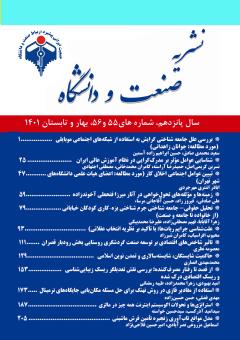زمینهها و مؤلفههای تحولخواهی در آثار میرزا فتحعلی آخوندزاده
محورهای موضوعی : عمومى
علی صادقی دهخوارقانی
1
![]() ,
فیروز راد
2
,
فیروز راد
2
![]() ,
حسین آقاجانی مرساء
3
,
حسین آقاجانی مرساء
3
![]()
1 - دانشجوی دکتری تخصصی رشته جامعه شناسی فرهنگی، واحد علوم و تحقیقات، دانشگاه آزاد اسلامی تهران، ایران
2 - استادیار گروه علوم اجتماعی، دانشگاه پیام نور، تهران، ایران
3 - دانشیار گروه علوم اجتماعی، دانشگاه آزاد اسلامی، تهران، ایران
کلید واژه: فتحعلی آخوندزاده, سنت, تحول خواهی, رویکرد بازتاب, تحلیل محتوای کیفی,
چکیده مقاله :
در این مقاله موضوع تحولخواهی در آثار و افکار میرزا فتحعلی آخوندزاده با تأکید بر نمایشنامههایش بررسی و تحلیل شده است. تحولخواهی در اینجا به معنی عبور از وضعیت موجود سنتی و تحقق تجدد بکار رفته است. در این مقالهی توصیفی و تحلیلیِ مبتنی بر رویکرد بازتاب، با استفاده از روشهای کتابخانهای و تحلیل محتوای کیفی، زمینههای اجتماعی، سیاسی، اقتصادی و فرهنگی ظهور و بروز این گرایش و نیز مؤلفههای آن در افکار و آثار نمایشی و غیر نمایشی وی توصیف و تحلیل شد. «رویکرد بازتاب» در کنار رویکردهای «شکلدهی» و «اثر به مثابه نهاد اجتماعی» یکی از سه رویکرد اصلی سنت جامعهشناسی ادبیات است. در این رویکرد اثر ادبی همچون آیینهای فرض میشود که واقعیات اجتماعی در آن انعکاس دارد و بسته به اینکه تمرکزش روی فرم و یا محتوای اثر ادبی باشد از چندین نظریهی شناختهشده همچون نظریهی ساختارگرایی تکوینی لوسین گلدمن تشکیل شده است. در پژوهش حاضر برای مطالعه زمینهها و شرایط اجتماعی، سیاسی، اقتصادی و فرهنگی ظهور گفتمان تحولخواهی از روش کتابخانهای و برای تعیین مؤلفهها و ابعاد گفتمان تحولخواهی در آثار آخوندزاده از روش تحلیل محتوای کیفی استفاه شد. نتایج بدست آمده نشان داد که وضعیت و تغییرات سریع اجتماعی، سیاسی، اقتصادی و فرهنگی مورد اشاره در دورهی مورد بحث به شکل مثبت و منفی در شکلگیری و نیز محتوای آثار آخوندزاده بازتاب واضحی دارد و تقابل شیوههای سنتی زیست اجتماعی با پدیدهها و شیوههای برخاسته از تجدد ، محور اصلی آثار وی را تشکیل داده است.
This paper delves into the theme of transformative inclination within the works and philosophies of Mirza Fath-Ali Akhundzadeh, with a specific focus on his theatrical productions. Modernization, in this context, denotes transcending the traditional status quo and embracing renewal. Employing a descriptive and analytical approach rooted in reflection, and utilizing library methodologies alongside qualitative content analysis, the socio-political, economic, and cultural contexts of the emergence and evolution of this trend are explored. Additionally, its manifestations within Akhundzadeh's theatrical and non-theatrical oeuvre are examined and dissected. The "reflection approach," alongside methodologies such as "shaping" and "works as social institutions," constitutes one of the three primary approaches within the literary sociology tradition. In this framework, literary works serve as mirrors reflecting social realities. Depending on whether emphasis is placed on the form or content of the literary work, it draws upon various established theories, such as Lucien Goldmann's theory. In this study, a combination of library research and qualitative content analysis was employed to investigate the social, political, economic, and cultural contexts underpinning the emergence of the discourse on modernization. The findings reveal that the rapid social, political, economic, and cultural transformations of the period under consideration have exerted both positive and negative influences on the formation and content of Akhundzadeh's works. Consequently, the juxtaposition of traditional social paradigms with those stemming from the ethos of renewal emerges as a central theme within his body of work
